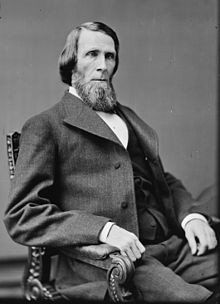
Samuel Bell Maxey
Today near Poison Spring, Arkansas, near Camden, Confederate troops ambush a federal force which was returning from foraging for corn and other food crops on nearby plantations.
The Union forces are led by Colonel James M. Williams, while Brigadier General John S. Marmaduke and Brigadier General Samuel Bell Maxey command the rebel forces. Surprise is on the side of the rebels as the federals encounter Confederate troops blocking the road. The Union troops, comprised of a large number of black soldiers, formerly slaves, fight valiantly. The First Kansas Colored Infantry repels two Confederate attacks, after which the federals are overwhelmed and forced to retreat in the face of a third Confederate attack.
Victorious, the Confederates chase their vanquished foes for over two miles before turning their focus to the hundreds of wounded and captured federals, many of whom are from the First Kansas Colored. What happens next is a reprise of the recent Battle of Fort Pillow: the Confederates set about killing wounded and captured black soldiers. By day’s end, the bulk of the dead Union men are blacks. This second slaughter of black soldiers by Confederate forces further inflames Northern anger and heightens Northern resolve to defeat the Confederate States.
A Kentucky native and Baptist layman, Brigadier General Samuel Bell Maxey (1825-1895) is a highly educated military man. Having fought in the Mexican War, afterwards he married and settled down to practice law, making Paris, Texas his home in 1857. Elected to the state senate on the eve of the Civil War, he declined the seat and raised the 9th Texas Infantry. He fights in the western theater of war, serving with distinction, including at Fort Hudson and Vicksburg. Today’s victory is especially satisfying for the Confederate commander. In addition to routing the enemy, Maxey’s soldiers capture 227 wagons of supplies from the federals.
Following the war Maxey returns to his law practice and is elected as a U.S. Senator in 1874, serving for two terms and taking a lead role in developing Texas in the post-war era. Unlike some Confederate veterans including Baptists, he seemingly harbors no ill will toward the North nor participates in the terrorizing of black citizens. A supporter of public education for freedmen in the early post-war years, Maxey later becomes friends with Generals William T. Sherman and Ulysses S. Grant.
Samuel and Marilda’s Paris, Texas home is placed on the National Register of Historic Places in 1971.
Meanwhile, despite Maxey’s rout of Confederates in Arkansas today, the fortunes of the Confederacy remain sobering. A short notice in today’s Richmond Daily Dispatch offers a small glimpse into the hardships that the war is visiting upon home front families:
The Anniversary of the Male Orphan Society of Richmond will be held this evening at 8 o’clock, in the First Baptist Church, (Dr. Burrow’s.) The public are earnestly invited to attend.
Many more Southern children will be orphaned before the war is over, children to whom Southern Baptists in the immediate post-war years will minister to through orphanages and rapidly expanding congregational Sunday schools.
Sources: “Engagement at Poison Spring,” Encyclopedia of Arkansas (link); “Maxey, U.S. Senator Samuel Bell,” in William Cathcart, The Baptist Encyclopedia, Philadelphia: Louis H. Everts, 1883, pp. 736 (link); “Maxey, Samuel Bell,” Handbook of Texas Online (link); “Samuel B. Maxey,” Wikipedia, including image (link); Louis Horton, Samuel Bell Maxey: A Biography, 1974 (link)


